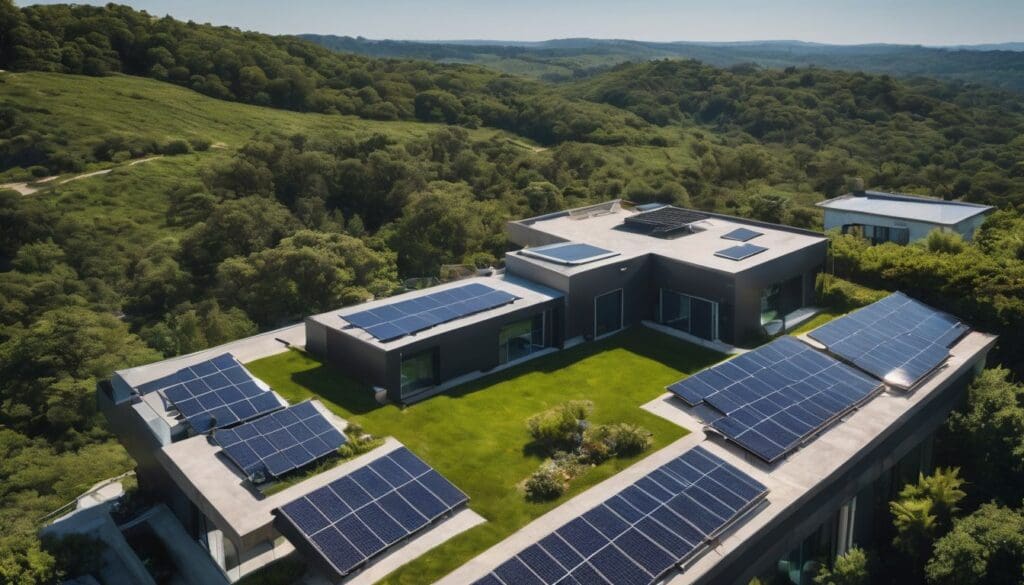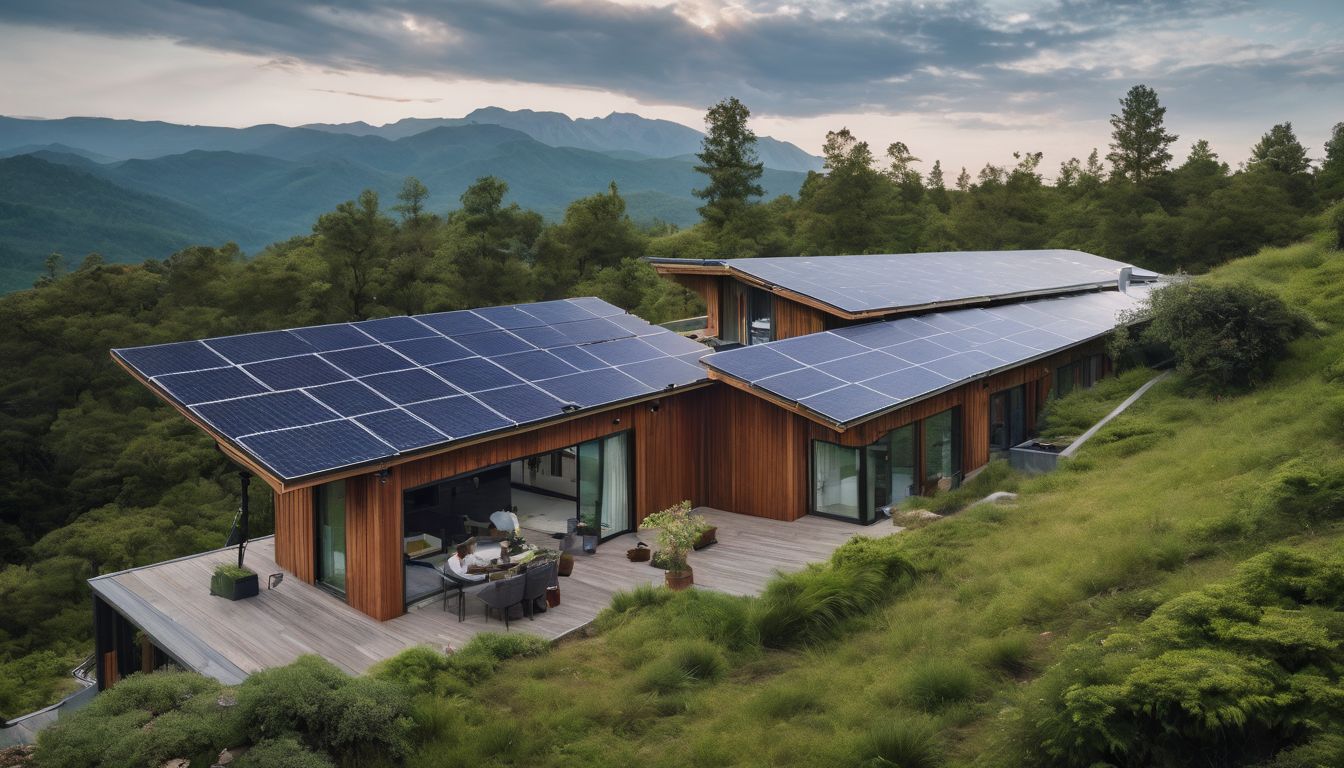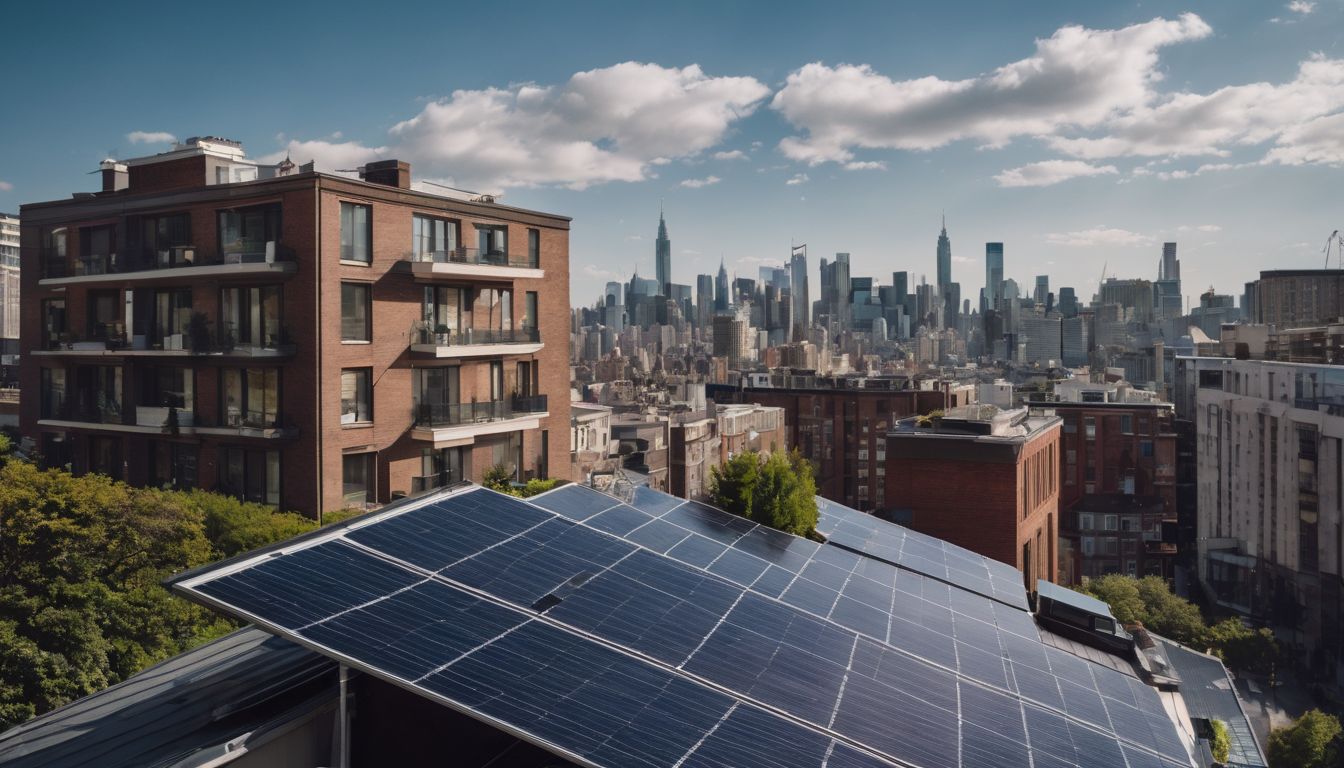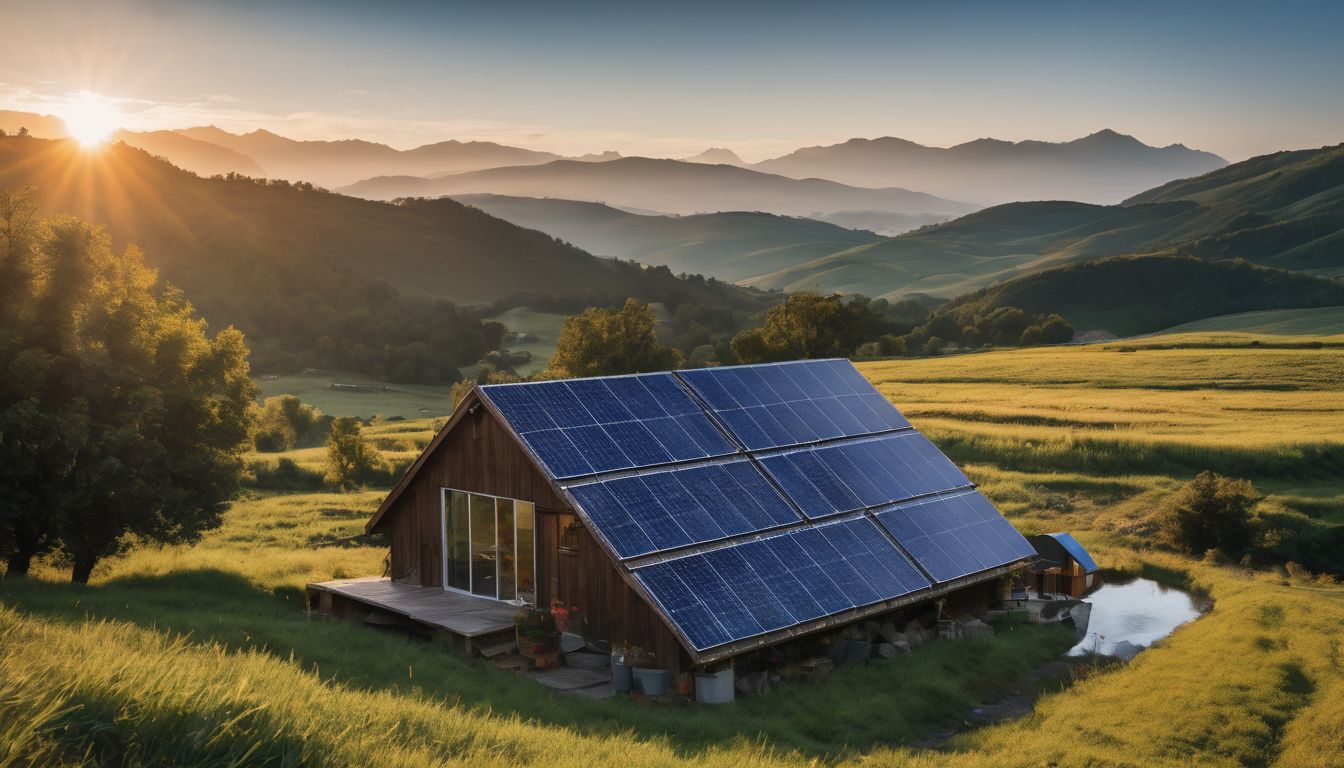Are you considering harnessing the sun’s power with solar panels on your roof? In recent years, solar installations have soared as homeowners seek sustainable energy solutions. This guide will navigate you through crucial legal steps and considerations for a smooth solar journey.
Dive in for an enlightened rooftop transformation!
Key Takeaways
- Before installing solar panels, check your roof’s condition to avoid future complications. Make sure it can support the weight and has good water drainage to handle the panels.
- It’s important to understand net metering and billing because they affect how you get credited for any extra energy your solar system produces. Always work with a qualified professional when connecting your system to the power grid.
- Research is key when selecting a contractor for installing solar panels; always consider their expertise, reputation, warranty offerings, and insurance cover.
- Familiarise yourself with local state laws around solar panel installation including permits, zoning laws and connection regulations so you comply fully before starting your project.
- Take advantage of government rebates and incentives that reduce installation costs of solar panels; stay updated on these programmes as they can significantly lower initial expenses and help save money long-term.
The Benefits and Popularity of Solar Panels
Solar panels are a clean and renewable energy source that can help reduce carbon emissions. With potential cost-saving benefits, their installation rates continue to rise as the demand for sustainable energy grows.
Clean and renewable energy source
Harnessing solar energy offers a powerful way to tap into a vast, inexhaustible resource. Every day the sun delivers more energy than we could possibly use, and photovoltaic systems transform this light into electricity without emitting harmful pollutants or carbon dioxide.
This process represents an environmentally friendly solution that supports efforts in conservation and reducing our carbon footprint.
As demand for sustainable power alternatives rises, so does the need to understand cost-saving possibilities associated with going green. The transition to solar power not only bolsters environmental stewardship but also poses an opportunity for significant reductions in utility bills over time, leading us to consider the financial impacts alongside the ecological benefits.
Cost-saving potential
Installing solar panels can lead to significant cost savings on energy bills. By harnessing the sun’s energy, homeowners can reduce their reliance on traditional utility providers, potentially saving thousands of pounds over the lifetime of the system.
Additionally, many governments offer rebates and incentives to offset the initial costs of installation, making solar power an even more appealing investment for environmentally conscious consumers looking to lower their carbon footprint and expenses.
Furthermore, with advancements in technology and increased demand for solar panels, prices have become more affordable than ever before. This makes it easier for homeowners to embrace renewable energy without breaking the bank.
Increasing demand and installation rates
As solar energy becomes more popular, the demand for solar panel installation is increasing significantly. Individuals and businesses are recognising the cost-saving potential and environmental benefits of renewable energy, leading to a surge in solar panel installations across the country.
This trend reflects a growing interest in sustainable living and reducing carbon footprints, with many people seeking to take advantage of government incentives and rebates available for solar panel installation.
Understanding the legal considerations before installing solar panels is crucial to ensure compliance with state-specific laws and regulations. From the condition of your roof to connecting to the grid, navigating these legal aspects helps individuals make informed decisions about their transition to clean energy solutions.
Legal Considerations Before Installing Solar Panels
Before installing solar panels, homeowners must consider the condition of their roof, weight limitations, water drainage, and potential obstacles. These factors are crucial in ensuring a successful installation and avoiding any legal issues down the line.
Roof condition and repairs
Assess the condition of your roof and ensure any necessary repairs are completed before installing solar panels. Consider factors such as leaks, structural integrity, and age of the roof. Insufficiently maintained roofs can lead to additional costs and potential damage to solar panels.
Roof shape and direction
Weight limitations
Before installing solar panels, it’s essential to consider weight limitations to ensure the safety and stability of your roof structure. Here are the key points to consider:
- Conduct a structural assessment of your roof to determine its load-bearing capacity.
- Consult with a professional engineer or contractor to evaluate if your roof can support the weight of solar panels.
- Verify if any additional reinforcement is required for the installation of solar panels.
- Consider lightweight solar panel options to minimise the impact on your roof structure.
- Ensure compliance with local building codes and regulations regarding weight limitations for rooftop installations.
- Discuss potential impacts on your home insurance policy with your insurance provider before proceeding with installation.
Water drainage and other potential obstacles
Before proceeding with the installation of solar panels, it’s crucial to assess the water drainage system and identify any potential obstacles that could impact the effectiveness of the panels. Here are some important considerations:
- Assess the existing water drainage system to ensure that it can accommodate the installation of solar panels without causing any water pooling or damage.
- Identify any potential obstacles such as nearby trees or structures that could cast shadows on the solar panels and affect their efficiency.
- Consider any local regulations or restrictions related to alterations to the roof for solar panel installation, including potential impacts on water drainage.
Connecting to the Grid
Understand net metering and net billing when connecting your solar panels to the grid. Make sure to contract with a qualified professional for the installation process.
Understanding net metering and net billing
When installing solar panels, it’s essential to understand net metering and net billing. Net metering allows you to send excess energy generated by your solar panels back into the grid for a credit on your utility bill.
This means that when your solar panels produce more electricity than you consume, the surplus is fed back into the grid, spinning your electric meter backward and offsetting future energy costs.
Net billing, on the other hand, refers to the process of selling excess energy produced by your solar panels at a predetermined rate agreed upon with your utility company. If your system produces more energy than you use in a given month, this surplus can be sold back to the utility at a set rate.
Contracting with a qualified professional
When considering solar panel installation, it is crucial to contract with a qualified professional who can ensure a successful and reliable setup. A reputable contractor will guide you through the process and provide expert advice on the best solar panel options for your property, ensuring compliance with all regulations and legal requirements. Look for these qualities in a solar panel installation professional:
- Expertise in Solar Panel Installation: Choose a contractor with a proven track record of successful solar panel installations and expertise in navigating local regulations and permit requirements.
- Licensing and Certification: Ensure that the contractor holds the necessary licences, certifications, and insurance to carry out solar panel installations in your area.
- Transparent Contracts: Opt for a contractor who provides clear, detailed contracts outlining the scope of work, timeline, costs, warranties, and any guarantees.
- References and Reviews: Research the contractor’s reputation by checking references from previous clients and online reviews to gauge their reliability and customer satisfaction.
- Quality Equipment Selection: Select a contractor who uses high-quality solar panels and associated equipment, backed by solid warranties to protect your investment.
- Understanding of Net Metering: The chosen professional should have a thorough understanding of net metering policies, ensuring that your system is efficiently connected to the grid for optimal energy production.
- Commitment to Customer Service: Look for a contractor who prioritises excellent customer service by providing ongoing support, maintenance services, and assistance with any warranty claims or issues after installation.
Signing a Contract
When signing a contract for solar panel installation, it’s important to thoroughly research and select a reputable contractor. Consider the warranties and insurance provided to ensure you’re getting the best service for your investment.
Researching and selecting a reputable contractor
Researching and selecting a reputable contractor for your solar panel installation is crucial. Look for these important qualities in a contractor:
- Qualifications: Ensure the contractor is certified and licensed to install solar panels.
- Experience: Choose a contractor with a proven track record of successful installations.
- Reputation: Research online reviews and ask for referrals from previous clients to gauge the contractor’s reputation.
- Communication: Opt for a contractor who communicates effectively and keeps you informed throughout the process.
- Warranties: Inquire about the warranties offered on both the equipment and the installation work.
- Insurance: Confirm that the contractor has adequate insurance coverage for any potential damages or accidents during installation.
- Pricing: Obtain detailed quotes from multiple contractors to compare pricing and services provided.
Considering warranties and insurance
When considering warranties and insurance for solar panel installation, it is important to carefully assess the following points:
- Research solar panel warranty options and understand what they cover, such as equipment warranties, performance guarantees, and workmanship warranties. It’s essential to choose a reputable contractor offering robust warranty coverage.
- Investigate insurance options to protect your investment in solar panels. Ensure that your homeowner’s insurance policy adequately covers the installation and any potential damages or losses associated with the system.
- Review the terms and conditions of both warranties and insurance policies thoroughly before signing any contract. Seek clarification on any unclear aspects from the provider or a legal professional if necessary.
- Consider additional protection through extended warranties or service contracts, especially for crucial components like inverters or batteries. Evaluate the cost-benefit of such add-ons to safeguard your long-term investment in solar energy.
- Consult with your chosen contractor about potential insurance requirements for the installation process to ensure compliance with local regulations and industry standards.
- Keep all documentation related to warranties and insurance in a secure place for future reference, including receipts, policy documents, warranty certificates, and contact information for insurers and warranty providers.
- Stay informed about any changes in warranty terms or insurance coverage over time and regularly review your policies to ensure they continue to meet your needs.
Solar Access Laws and Regulations by State
Each state has its own laws and regulations regarding solar panel installation, including permitting processes, zoning laws, energy efficiency requirements, and grid connection regulations.
It is important to understand the specific rules in your state before installing solar panels on your property.
Understanding state-specific laws and regulations
Understanding state-specific laws and regulations is crucial when considering solar panel installation. Each region has its own set of rules and requirements regarding permits, zoning, energy efficiency standards, and grid connection regulations.
It’s important to research the specific laws in your area to ensure compliance with all necessary legalities before proceeding with the installation process.
Familiarising yourself with state-specific laws will help you take advantage of rebates and incentives provided by government solar panels programmes. By understanding these regulations, you can make informed decisions that align with environmental conservation efforts.
Let’s now delve into the factors affecting rooftop solar panel installation in different states.
Taking advantage of rebates and incentives
Government incentives and rebates can significantly reduce the upfront costs of installing solar panels. Researching available programs in your area, such as tax credits or cash rebates, can help make solar energy more affordable for homeowners.
Additionally, some utility companies offer incentives for connecting to the grid, further offsetting the initial investment.
By leveraging these opportunities, environmentally conscious individuals can not only contribute to a sustainable future but also enjoy financial savings on their energy bills over time.
Conclusion
In conclusion, understanding the legal considerations of solar panel installation is crucial for a successful and compliant project. Researching state-specific laws and regulations can help you take full advantage of rebates and incentives.
Selecting a reputable contractor with warranties and insurance ensures peace of mind for your investment in environmentally friendly energy solutions.
FAQs
1. What laws must I follow when installing solar panels?
You must adhere to solar panel installation laws, ensure compliance with environmental regulations and acquire necessary permits specific to your area.
2. Are there special regulations for rooftop solar panels?
Yes, rooftop solar panel considerations involve certain building codes and safety standards that you should check before installation.
3. Do I need a permit to install solar panels on my property?
Indeed, obtaining a solar panel installation permit is generally required and forms part of the legal process to validate your project meets local requirements.
4. How do consumer protections apply to me getting solar panels?
Solar panel consumer protection laws secure your rights regarding product warranties, construction agreements, and safeguard against unfair business practices.
5. Can I receive any government incentives for installing solar panels?
Governmental programs often offer incentives meant to encourage the adoption of solar energy; researching these can help reduce costs associated with the installation process.





